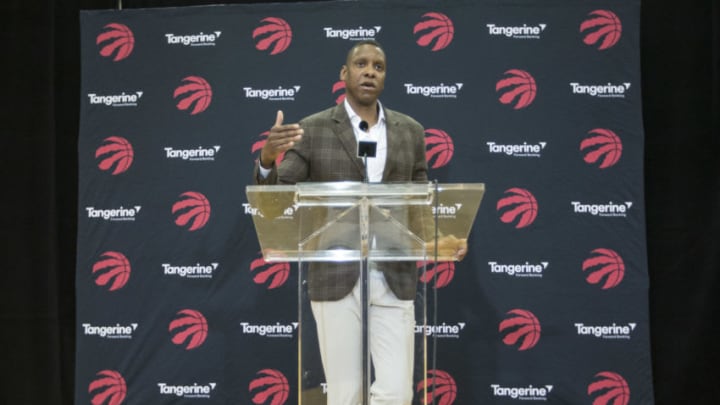Masai Ujiri has been the senior basketball man in Toronto during the most successful period in Raptors history. That’s not a coincidence.
The title of this post is slightly misleading. Masai Ujiri has been hired twice by the Toronto Raptors. For our purposes, I’ll focus on his second hiring as (ultimately) President.
Has there been an executive in any professional sport with a more intriguing backstory than Masai Ujiri? He was born and raised in Nigeria, then emigrated to the U.S. to play college basketball. After a pro career in Europe, he impressed the brass of the Orlando Magic enough to get hired as an unpaid scout.
Jeff Weltman, then with the Denver Nuggets, was sufficiently taken with Ujiri to introduce him to his boss, Kiki Vandeweghe. Ujiri wangled a real job (i.e., he got paid) as an international scout.
Bryan Colangelo, the top man with the Raptors, brought Ujiri to our city as Director of International Scouting, then promoted him in 2008 to Assistant GM. He returned to Denver as the EVP of Basketball Operations in 2010. Less than six months later, he received major kudos for getting serious value in return for Carmelo Anthony, who had decided he wanted a trade to the New York Knicks.
In May of 2013, after the Nuggets shocked the league with 57 wins, Ujiri became the first (and to date only) non-American to win the NBA’s Executive of the Year award. Sadly for Denver, he was all but out the door.
Dateline: May 31, 2013
Tim Leiweke joined Maple Leaf Sports & Entertainment (MLSE – the Raptors ownership group) as President & CEO in April of 2013, and wasted no time in throwing his weight around. Perhaps the executive most severely bruised was Bryan Colangelo, who flunked his presentation to his new boss. Leiweke decided, or more likely had already planned, to bring Ujiri back to Toronto as the Raptors’ senior executive.
Masai, Colangelo’s former employee, was now his superior, an unworkable situation which resolved itself with BC’s demotion to “consultant”, and ultimate departure. Ujiri quickly moved out Ed Stefanski, and Bobby Webster and Weltman became Masai’s principal lieutenants.
In his first major roster move, Masai found a taker for the bitterly disappointing Andrea Bargnani. A few months, he made a deal with the Sacramento Kings which actually trumped his “addition by subtraction” disposal of Bargs. Masai dumped another Colangelo favourite, Rudy Gay, plus benchers Aaron Gray and Quincy Acy, and brought four players to Toronto who were part of the team’s turnaround.
A phenomenal record
Since Masai has been in charge, the Raptors seasonal records read as follows:
- 2013-14: 48-34
- 2014-15: 49-33
- 2015-16: 56-26
- 2016-17: 51-31
- 2017-18: 59-23
The downside of regular-season success is the bottom of the draft. While Masai whiffed on his first draft (more on that soon), he’s been successful since. Delon Wright, Jakob Poeltl, Pascal Siakam and OG Anunoby have all made the team. Plus Fred VanVleet is on the roster as an undrafted free agent – that’s like finding a hundred-dollar bill in a pair of old jeans.
This isn’t the place for a detailed review of all Ujiri’s moves. Suffice to say, the vast majority have worked out, and those that haven’t, Masai has recognized and dealt with. For instance, the failed selection of Bruno Caboclo in 2014…Masai has admitted he didn’t think through how Caboclo’s development could be damaged if there wasn’t an appropriate place for him to get lots of playing time. Bruno’s time in the D (now G) League was wasted until Toronto acquired its own minor league team, the 905. Sadly, the time lost couldn’t be made up, and Bruno was moved to Sacramento.
Everyone makes mistakes, but not everyone fesses up. Masai doesn’t claim to know it all, or to be flawless. He may not be, but when you compare him to his predecessors, there’s no contest. He’s the best basketball executive in Raptors history.
